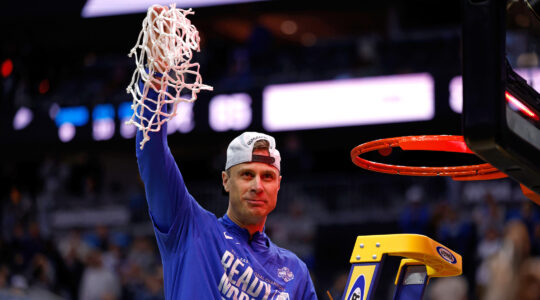BALTIMORE (JTA) – Stationed at Gate H, behind the center-field scoreboard at the northern end of the distinctive brick B&O Warehouse, Robert Schapiro greets fans outside Oriole Park at Camden Yards with Hall of Fame-caliber vocal embraces.
“Welcome! Thanks for coming,” he tells a fan on a wet and chilly Thursday afternoon, the third game of the new baseball season.
“Welcome, everybody!”
“I’ve been here 23 years, and you’ve been a big part of my life.”
At 57, Schapiro remains a bundle of joy — a large presence, in girth and personality, for fans entering the ballpark where he has been employed since it opened in April 1992 as the home of the Baltimore Orioles. For the last 18 years, he has worked at Gate H.
Whatever Schapiro’s developmental disability – he says his condition includes obsessive-compulsive disorder, an inordinate worrying over relatively minor issues — or the restrictions it places on his life, the 81-games-a-year Camden Yards experience is clearly agreeable.
“I love the job. It’s an amazing job,” Schapiro says just before the fans, many wearing the garb of the Orioles and the visiting Boston Red Sox, proceed past the turnstiles.
He’s fond of the baseball team and loves sports. But above all it’s about the people.
The work provides Schapiro with fulfillment and a social circle. Friends include his co-workers, such as ticket takers Bob Bennett, John Hagert and Renee Myles, and Joe Vega, who administers the adjacent cage where fans can leave items not allowed inside.
Schapiro points to someone stationed at the far turnstile 40 feet away.
“You see that little woman at the end? She got Employee of the Month,” he says, evincing pride by association.
Schapiro says he is “blessed” to have the job.
Colleagues and fans, along with those who know him in the Baltimore Jewish community, say Schapiro possesses an intelligence and a heart of gold that make him special, although they admit that his forthrightness and often-disheveled appearance can be off-putting at first.
Some fans ignore Schapiro’s welcome. Others return the greeting and, like the members of a visiting youth hockey team from Boston, take pictures with him.
“He’s a comical fellow, always,” Vega says. “He’s fun to work with. He always gives me stuff,” including a book on Jewish baseball players.
Schapiro is a regular caller to the weekly Baltimore radio show “Shalom USA,” which he says provides his primary source of information on Jewish affairs. The interviews and announcements often alert Schapiro to the many lectures, film screenings and commemorations he attends.
“Obviously he has challenges in his life, but he wants to learn, he wants to grow,” says the show’s host, Jay Bernstein. “Every time I see him, he thanks me for the program and all he gets out of it. It’s nice to hear.”
Four years ago, at 53, Schapiro celebrated his bar mitzvah. At a Sabbath afternoon service at Beth El Congregation, he chanted the Torah portion.
One aliyah at the reading went to Neil Frater, his classmate at Pikesville High School who regularly joins Schapiro and the latter’s brother, William, in the upper deck for Baltimore Ravens home football games.
“I felt like I was helping a friend achieve something in his life,” Frater says of the bar mitzvah. “This is a man who, despite his challenges, has succeeded in [attaining] some milestones.”
The accomplishments include graduating from the University of Maryland with a degree in criminology. Schapiro held several jobs until a life-altering January 1991 interview at Memorial Stadium for positions at Camden Yards, which the Orioles were building downtown.
Dave Shegan, then working for a local job-placement agency, “will always be my hero because he thought I’d be good for this work, and he was right,” Schapiro says.
The agency, known as STEP (the Schapiro Training and Employment Program), was established by Schapiro’s grandfather, Ben, a textile executive.
Shegan says he knew that sending Schapiro for the Orioles interview would produce an ideal match. Previous jobs in offices, he explains, “were not really good for him” because of workplace protocols that demand decorum.

Robert Schapiro, left, and Sgt. Nicholas McCulley, to whom he had given a ticket for the day’s game, April 3, 2014. (Hillel Kuttler)
“I’ve been doing this kind of work close to 30 years, and Robert is somewhat of a unique case,” Shegan says. “He has a lot of drive, and he’s gregarious.”
Those qualities come through in abundance at Gate H.
“Have a great Passover,” Schapiro calls to a young man wearing a kippah.
“Happy birthday to you,” he begins singing to Brian Jones, whose wife, Michelle, checks in three celebratory balloons at Vega’s cage, where Schapiro retrieves a game program he’d bought earlier. He presents it to Jones.
“I have all the respect in the world for you. I’ll be thinking of you,” he tells an acquaintance’s son who will be leaving soon to serve in the Israeli army. Schapiro then turns to the father and says, “That is a classy young man.”
Thirty minutes earlier, U.S. Army Sgt. Nicholas McCulley, wearing fatigues, and his wife, Christine, came by. The McCulleys were paying for a purchase at a nearby sandwich shop when Schapiro handed the cashier $4 toward their meal and gave McCulley a ticket to the game.
Now the McCulleys are buying a second ticket.
“It was very kind of him,” McCulley says.
The men pose for a photograph; Schapiro asks that it accompany this article.
The opening of Camden Yards revolutionized the architectural landscape of Major League Baseball. For Robert Schapiro, it gave him his place in life.
JTA has documented Jewish history in real-time for over a century. Keep our journalism strong by joining us in supporting independent, award-winning reporting.




